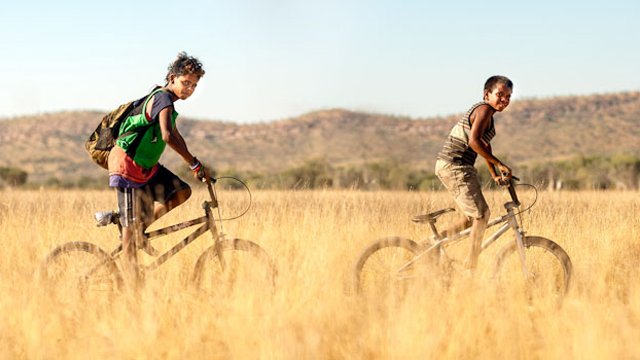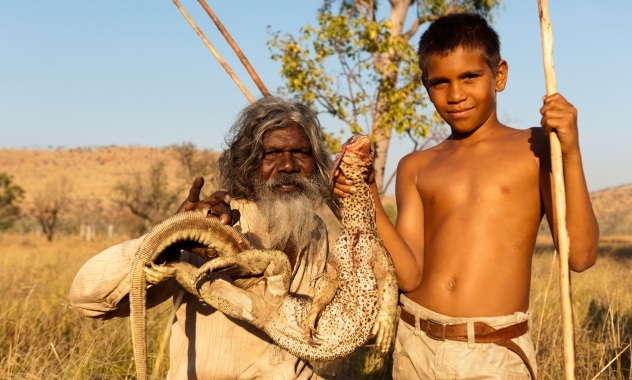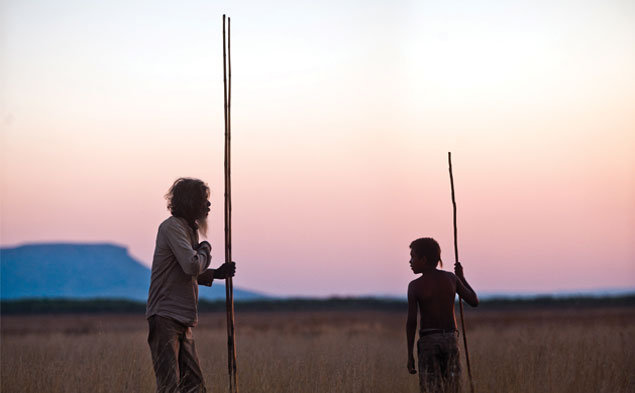|
Catriona
McKenzie's Satellite Boy is a case of good
intentions limiting the possibilities of a film. This is
unapologetically a
coming of age story, where the young central character learns to fully
embrace
their indigenous heritage and survival skills, shunning the modern
consumerist
world.
Where
other films like Samson and Delilah have exposed the
bleakness and nihilism of the outback life, this film is intended as a
gift to
Aboriginal communities and their belief in the Milky Way as a vision of
heaven.
Yet through this idealism McKenzie's film is also overly simplistic. It
substitutes realism, detail and insight to uphold and prove its
sentimental and
conservative values.

The film
is about the journey of
Pete (Cameron Wallaby), a young Aboriginal boy who lives with his
grandfather
Old Jagamarra (David Gulpilil) and is reluctant to embrace the ways of
the
bush. They live in the outback town of Wyndham in an abandoned cinema.
When
their land is threatened by a
mining company Pete sets off to confront the manager of the company to
try and
stop them. He leaves his grandfather behind but is joined by the
equally young
and inexperienced Kalmain (Joseph Pedley). Together they have to use
their
outback skills to survive and find the company as they cross their
desert.

The film
was shot in North Western
Australian in the Kimberley region, which is rich in Aboriginal culture
and
listed as a world heritage area. Special permission had to be granted
to film there,
which accounts for why the film is highly sanitised. The film never
weighs up the
ramifications of this journey.
Both Pete
and Kalmain continually
avoid tension and danger. They gather popcorn and water before the
journey but
never seem to be short of food because gathering food from a rock is
sufficient. They don't suffer physically either from heat exhaustion
because they're
lucky enough to be able to find a river to cross. The most dangerous
episode is
when they find a loaded magnum handgun. Yet this also results in a
positive
outcome that foils the miners.

The film
is so chipper about the
power of heritage and culture that it denies its own moral compass.
What
happens after Pete rejects the consumer life of his mother and stays in
the
outback? He disappears into the desert at the end of the film, which is
allegorical
for committing himself to the land.
The
reality though is that children
need a balanced life. Understanding their heritage and who that makes
them is
invaluable and should never be forgotten. However, is schooling,
friends and
employment somehow less important? These are equally essential in
building the
character of any person, whatever their heritage or background is, but
the film
doesn't make a point of that.

Similarly,
the psychological damage
of living in the outback is untested too. In recent years we have
debated the
racial boundaries of intervening into Aboriginal communities because of
the
number of documented cases relating to the likes of sexual assault and
alcoholism. Satellite Boy doesn't
have the psychological depth or bravery to explore and debate the
pressing
issues faced by self-governing communities and the impact on young
individuals.
Its
content with being a beautifully
photographed yet hollow movie, one that shields itself from ever being
culturally
insensitive but consequently weakens its own moral complexity.
|